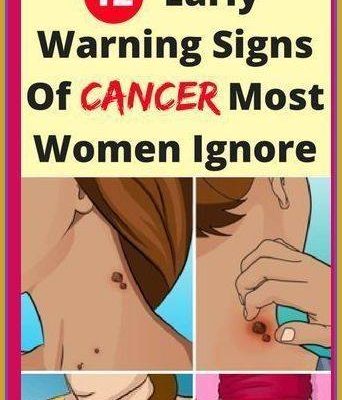Cancer remains a leading cause of mortality worldwide, but one of the most powerful tools against it is early detection. For women, recognizing subtle changes in the body can mean the difference between timely treatment and delayed diagnosis. While not every symptom guarantees cancer, being aware of these early warning signs can prompt timely medical attention. Here’s a detailed breakdown of 12 symptoms that women should never overlook.
1. Persistent Unexplained Weight Loss

Losing weight without trying might sound appealing, but it can also be a red flag for underlying health issues. When your weight drops rapidly without changes to your diet or activity level, it might point to cancers like those of the stomach, pancreas, or lungs. The body uses a lot of energy when fighting these diseases, often leading to unexplained weight loss. If the numbers on the scale are dropping without reason, it’s time to consult your doctor.
2. Unusual Skin Changes
Our skin often tells a story about our health, and sudden changes should never be ignored. Be on the lookout for alterations in moles or spots—particularly changes in size, color, or texture—as these could signal melanoma. Unexplained rashes, skin redness, or lesions that don’t heal might also point to underlying skin cancer. When in doubt, schedule a dermatologist appointment to check out any suspicious spots.
3. Noticeable Breast Changes
Breast cancer remains one of the most common cancers in women, so staying vigilant about any changes is crucial. Lumps, discomfort, or unusual alterations in breast size or shape can all be warning signs. Regular self-examinations are essential, and annual mammograms after a certain age can help catch issues early. Don’t wait—if something feels off, trust your instincts and get it checked.
4. Persistent Fatigue That Won’t Go Away
Feeling tired is normal, but if you’re experiencing a level of exhaustion that doesn’t improve with rest, it’s time to take notice. Chronic fatigue can be a symptom of leukemia or other blood-related cancers. It may feel like your body is carrying a heavy weight, even after a good night’s sleep. If this kind of fatigue persists, reach out to a healthcare professional.
5. Changes in Bowel or Bladder Habits
Your digestive and urinary systems often provide early warning signs for certain cancers. Persistent diarrhea, constipation, or blood in the stool can point to colon cancer, while blood in the urine might indicate bladder or kidney cancer. These changes are often subtle at first, so paying attention to your body’s patterns is key. If anything seems off, schedule a medical consultation.
6. Unexplained or Chronic Pain
Pain that lingers or appears without explanation could signal an underlying issue, including certain cancers. Back pain, abdominal discomfort, or persistent joint pain should not be ignored, especially if there’s no clear cause. Bone cancer and other malignancies can often manifest as unexplained aches, so listen to your body and don’t dismiss chronic discomfort.
7. Abnormal Vaginal Bleeding

Bleeding outside of your menstrual cycle or after menopause is not normal and should be investigated promptly. It can be a symptom of cancers affecting the cervix, uterus, or ovaries. While there may be benign explanations, it’s better to err on the side of caution. Early detection of these cancers significantly improves treatment outcomes.
8. Persistent Cough or Hoarseness
A cough that doesn’t go away, especially if it’s accompanied by blood, could indicate lung or throat cancer. While a lingering cough might seem harmless, it’s essential to pay attention if it lasts for weeks or changes in intensity. Smoking history or exposure to pollutants can increase risk, so never dismiss respiratory symptoms.
9. Swollen Lymph Nodes
Your lymph nodes, located in areas like your neck, underarms, and groin, often swell in response to infections. However, if they remain enlarged without an obvious cause, it could be a sign of lymphoma or leukemia. Swollen lymph nodes that persist or grow larger should always be evaluated by a doctor.
10. Unexplained Skin Lesions or Sores
Non-healing sores or lesions, especially in areas exposed to the sun or inside the mouth, can point to skin or oral cancer. Pay attention to any unusual discoloration or rough patches of skin. Early detection is critical, so don’t delay getting unusual sores checked.
11. Digestive Changes Like Bloating or Difficulty Swallowing

Persistent bloating, a sudden loss of appetite, or trouble swallowing could signal cancers affecting the stomach, esophagus, or ovaries. While these symptoms are common with less serious conditions like indigestion, their persistence warrants medical attention. Early intervention could make all the difference.
12. Unusual Changes in Nails
Nails can often be a window into your overall health. Watch for thickening, unusual discoloration, or dark streaks under the nails, which may indicate skin or lung cancer. While changes in nails are often harmless, significant or sudden alterations should be evaluated.
The Importance of Awareness and Action
Each of these symptoms may have non-cancerous explanations, but that doesn’t mean they should be ignored. Early detection saves lives, and trusting your instincts when something feels off is critical. Routine check-ups, a healthy lifestyle, and staying informed about these warning signs can empower you to take charge of your health.
Final Thoughts: Trust Your Body and Take Action
When it comes to cancer, knowledge truly is power. By staying vigilant about these early warning signs and seeking medical advice when something doesn’t feel right, you can take proactive steps toward early detection and treatment. Encourage your loved ones to do the same—it could save a life.
Remember, it’s not about living in fear but about listening to your body and acting when necessary. Don’t hesitate to share this article with friends and family to spread awareness. Together, we can create a world where early detection becomes the norm and lives are saved every day.
Stay healthy, stay informed, and always prioritize your well-being.



